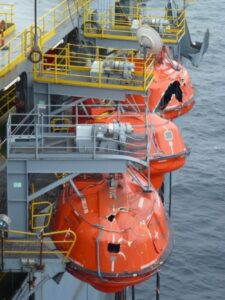Company fined £900,000 after dad crushed to death
A company in Leicestershire has been fined £900,000 after a father-of-two was crushed to death.
Lee Benham died on 4 November 2021 while attempting to move a scissor lift at Nationwide Platform Limited’s workshop in Liskeard, Cornwall.
Lee’s wife, Kelly Benham, says her heart has been ripped out after his passing.

The 45-year-old, who was from south east London but lived in Liskeard, was working for Nationwide as an LGV driver when the incident occurred. He was operating a scissor lift from the ground to clear an access path so he could move a pieces of machinery out of the workshop and load it onto his lorry in the yard.
The moveable controls on the scissor lift were in a position meaning that their direction was inverted, and when Lee operated the machinery, it came towards him and crushed him against a static scissor lift.
A Health and Safety Executive (HSE) investigation into the incident found Nationwide Platforms Limited failed to sufficiently consider the dangers of operating machinery via moveable controls, and failed to provide appropriate monitoring and supervision during the morning when drivers were loading machinery onto their lorries.
There were 29 fatalities in 2022/23 caused by contact with moving vehicles or machinery. HSE guidance can be found at: Equipment and machinery – HSE

Lee’s wife Kelly Benham said: “Lee was my soulmate, my best friend, my rock. Now I have nothing apart from my girls. There are no words that can describe when you have had your heart ripped out. Our lives are in pieces, and it is just the three of us now.”
Nationwide Platforms Limited, of Central Park, Lutterworth, Leicestershire, pleaded guilty to breaching Section 2(1) of the Health and Safety at Work etc Act 1974. The company was fined £900,000 and ordered to pay £12,405 in costs at Plymouth Magistrates’ Court on 21 December 2023.
HSE inspector Simon Jones said: “This was a tragic incident and a stark reminder to businesses to be thorough in their risk assessment. The situation which led to Lee’s death would not have arisen had appropriate control measures been in place.”
This HSE prosecution was brought by HSE enforcement lawyer Jonathan Bambro and supported by HSE paralegal officer Helen Jacob.
Notes to Editors:
- The Health and Safety Executive (HSE) is Britain’s national regulator for workplace health and safety. We prevent work-related death, injury and ill health through regulatory actions that range from influencing behaviours across whole industry sectors through to targeted interventions on individual businesses. These activities are supported by globally recognised scientific expertise.
- More information about the legislation referred to in this case is available.
- Further details on the latest HSE news releases is available.

